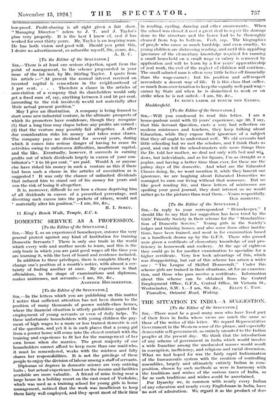SIR,—There is at least one serious objection, apart from the
point of management, to the scheme propounded in your issue of the 1st inst. by Mr. Stirling Taylor. I quote from his article :—" At present the normal interest received on invested capital is somewhere in the neighbourhood of 5 per cent.. . . Therefore a clause in the articles of association of a ccmpany that its shareholders would only get a fixed sum of, say, anything between 5 and 10 per cent. (according to the risk involved) wculd not materially alter their actual present position."
May I give an illustration. A company is being formed to start some new industrial venture, in the ultimate prospects of which its promoters have confidence, though they recognize (1) that a long time may elapse before any profits are earned :
(2) that the venture may possibly fail altogether. A after due consideration risks his money and takes some shares. The company pays no dividend for several years, during which it comes into serious danger of having to cease its activities owing to unforeseen difficulties, insufficient capital, and the like. Eventually, however, it succeeds in earning profits out of which dividends largely in excess of your con- tributor's " 5 to 10 per cent. " are paid. Would A or anyone else have risked his money in such a venture as this if there had been such a clause in the articles of association as is suggested ? It was only the chance of unlimited dividends that induced him to stand out of his money for years and run the risk of losing it altogether.
It is, moreover, difficult to see how a clause depriving him of all dividends in excess of a prescribed percentage, and diverting such excess into the pockets of others, would not `• materially alter his position."—I am, Sir, &c.,










































 Previous page
Previous page